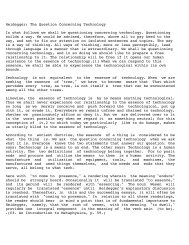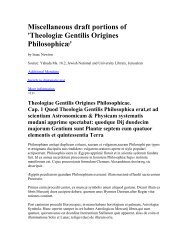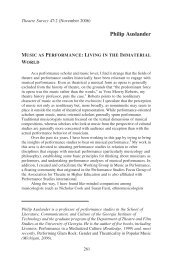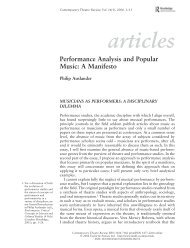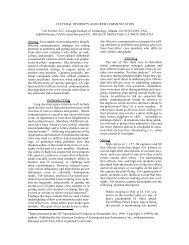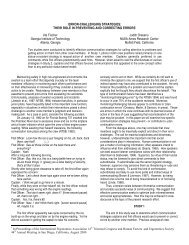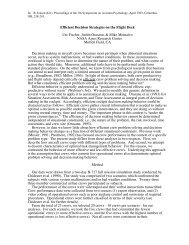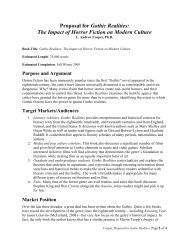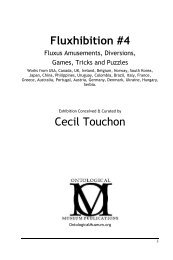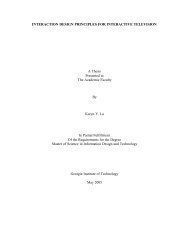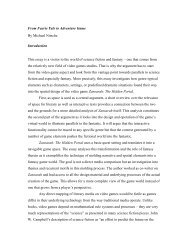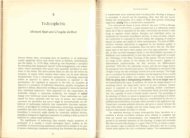william t. costello, sj - The School of Literature, Communication, and ...
william t. costello, sj - The School of Literature, Communication, and ...
william t. costello, sj - The School of Literature, Communication, and ...
You also want an ePaper? Increase the reach of your titles
YUMPU automatically turns print PDFs into web optimized ePapers that Google loves.
PROLOGUE 3<br />
In general, however, Oxford seems to have left the scholastic world<br />
behind more gradually than did Cambridge.<br />
Although the story <strong>of</strong> seventeenth-century Cambridge is that <strong>of</strong><br />
scholasticism <strong>of</strong> its<br />
flourishing, decline, <strong>and</strong> fall there has<br />
been, except for Samuel Eliot Morison's brilliant chapters in <strong>The</strong><br />
Founding <strong>of</strong> Harvard College (1935), no specific study <strong>of</strong> scholasticism<br />
at Cambridge. Explorations have been made, <strong>of</strong> course, into<br />
the area. In addition to such contemporary critical estimates as<br />
John<br />
Hall's An Humble Motion . . .<br />
(1649), John Webster's<br />
Academiarum Examen (1654), Seth Ward's Vindiciae Academiarum<br />
(1654) <strong>and</strong> Meric Casaubon's A Letter <strong>of</strong> Meric Casaubon<br />
. . . to Peter du Moulin (1669), there is Thomas Fuller's <strong>The</strong><br />
History <strong>of</strong> the University <strong>of</strong> Cambridge, Since the Conquest (1655).<br />
Fuller's account is invaluable, since he writes from within the<br />
milieu, as anti-Aristotelian <strong>and</strong> sympathetic to the changes which<br />
he recognizes as taking place about him.<br />
In the nineteenth century, George Dyer wrote his engaging History<br />
<strong>of</strong> the University <strong>and</strong> Colleges <strong>of</strong> Cambridge (1814), while<br />
Thomas Baker collected an immense amount <strong>of</strong> pertinent material<br />
in his meticulously copied MSS. Baker, preserved partly in the<br />
University Library, Cambridge, <strong>and</strong> partly in the British Museum.<br />
Building largely upon the Baker manuscripts, Charles Cooper in<br />
his Annals <strong>of</strong> Cambridge (1842-53) put together a sourcebook,<br />
which must remain the guide <strong>of</strong> stumbling steps. George Peacock,<br />
in his Observations on the Statutes . . . <strong>of</strong> Cambridge (1841), has<br />
documented his materials invaluably. Bishop Christopher Wordsworth's<br />
works on eighteenth-century Cambridge include much<br />
valuable seventeenth-century material.<br />
Aside from recent histories <strong>of</strong> individual colleges, such as Master<br />
George M. Trevelyan's Trinity College: An Historical Sketch<br />
(1943) <strong>and</strong> A. L. Attwater's Pembroke College: A Short History<br />
(1936), little attention has been paid seventeenth-century Cambridge<br />
since J. B. Mullinger's Cambridge Characteristics in the<br />
Seventeenth Century (1867). When it is realized that Mullinger's<br />
little work was originally a prize undergraduate essay, his accom-<br />
plishment is little short <strong>of</strong> astounding. <strong>The</strong> work, however, as<br />
Mullinger himself realized in writing his three-volume History <strong>of</strong><br />
the University <strong>of</strong> Cambridge (1888), needed much revision <strong>and</strong><br />
supplementation. Writing without the advantage <strong>of</strong> the intense<br />
medieval researches <strong>of</strong> the past seventy-five years, researches which<br />
he himself enthusiastically furthered in later life, he tends in his<br />
earlier work to look upon the Middle Ages as a cultural bell jar,



